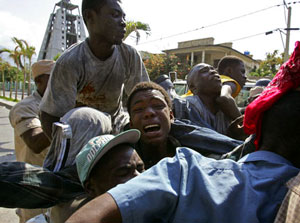- One-on-One Interview with Haitian activist Noluthando Williams (FCN, 11-15-2007)
- Haiti represents more than chronic poverty (FCN, 10-26-2006)
- How the U.S. impoverished Haiti (FCN, 09/10/2003)

UNITED NATIONS (FinalCall.com) – The Organization of American States and an ad hoc advisory group representing the United Nations Economic and Social Council recently met in Washington to discuss deepening cooperation to promote stability and socio-economic development in Haiti.
The 12-member UN group, led by Canadian Ambassador John McNee, said in a press statement their objective was to build a more efficient system of aid delivery, capacity building and development for 8.5 million Haitians. The OAS secretary-general, Amb. Albert Ramdid, said his organization wants to be more forward thinking about what needs to be done to strengthen democracy, the parliamentary process and governance.
Thousands of starving Haitians April 1 took to the streets in the countryside and in Haiti’s capital city of Port-au-Prince in what the Western press terms riotous behavior. On April 8, Haitians attempted to enter the National Palace on the Champs de Mars Plaza and were met by armed UN peacekeeping troops from Latin America nations such as Bolivia, Brazil and Chile, who fired rubber bullets and tear gas. The unofficial count was 5 dead and 40 wounded.
Press reports said UN peacekeepers failed to restore order as “bands of looters sacked stores, warehouses and government offices.”
Corporate media coverage attempts to explain away international failure to help promote real economic progress in Haiti, according to activists Marguerite Laurent of the Connecticut-based Haitian Lawyers Leadership Network and Brian Conconnon of the Oregon-based Institute for Justice and Democracy in Haiti.
“They are near famine right now. Prices of bread, wheat and milk have risen 50 percent, adding to an agony already existing,” Ms. Laurent told The Final Call.
“The turmoil didn’t just begin on April 1,” argues Mr. Conconnon. “For centuries the international community has prevented Haiti from being self-sufficient,” he told The Final Call.
Ms. Laurent agrees, saying anger did not just pop up overnight.
“The Haitian people have been brutalized, beaten and devastated by U.S. power for over a century, beginning in 1914, when the U.S. took over from the French. The U.S. invaded Haiti for missing indemnity payments to the French, which were covered by U.S. banks,” she explained.
“What we see in Haiti today is a direct result of the coup d’etat by President George W. Bush, when he removed, with the help of the Marines, Canada and France, the democratically elected president, Jean-Bertrand Aristide.
“The new U.S.-sponsored government, now headed by President Rene Preval, gave a three-year tax break to Haiti’s business class, cut the minimum wage of $1.60 a day in half, gave 10 years of back pay to an army that had been demobilized by President Aristide and assigned Haiti to endless International Monetary Fund/World Bank debts,” Ms. Laurent said.
The World Bank reported in 2006, after Mr. Preval’s election, that Haiti’s per capita income was about $480. After two and a half years of foreign intervention, the IMF reported over 70 percent of Haitians were living on less than $2-a-day. Some survived on as little as 44 cents a day, according to the Institute for Justice and Democracy in Haiti.
The IMF said Haiti’s real per capita gross domestic product in 2006 was just 70 percent of the country’s GDP in 1980. Lack of access to basic public services, like health care, education, running water, sanitation, and social indicators are alarming, the IMF noted. Infant mortality, 76 deaths per 1,000 births, is two times the regional average and life expectancy is about 18 years short of the regional average.
Sanitary facilities are also available to a very small portion of Haiti’s population, IMF figures showed.
President Preval asked for “peace” and a return to the spirit of “working together” during an April 9 half-hour address from the National Palace. But Haitians have called for his resignation and for Prime Minister Jacques-Edouard Alexis to step down, according to news reports.
“I understand your problem and your despair. I offer you sustainable solutions,” President Preval said. Speaking over state-sponsored television, he told fellow countrymen his plans for solutions would lead to “national production” and the “consuming of national products.”
President Preval announced fertilizer subsidies for farmers to boost production and a government plan to promote production of eggs, chicken and rice. There are no “easy economic solutions,” he admitted.
Haiti’s economic picture is gloomy because of almost $1 million-a-day payments to service international debt, said Mr. Conconnon.
UN data shows Haiti spent $56 million on debt service payments for 2006-2007. Rep. Maxine Waters has said Haiti owes over $1 billion to multilateral financial institutions.
“Haiti is a country with tremendous development needs and numerous impediments to development; one of those impediments is a devastating burden of international debt,” Ms. Waters noted on her congressional website.
The California Democrat along with Rep. Spencer Bachus (R-Ala.) recently sent a letter to the U.S. secretary of the treasury urging him to expedite cancellation of Haiti’s debt. The lawmakers also sponsored HR-241, the Haitian Debt Cancellation Resolution.
“The cancellation of Haiti’s debts will enable the democratically elected government of Haiti to improve healthcare, education, and invest in critical infrastructure needs,” Rep. Waters said.
In early April, the House Financial Services Committee passed Rep. Water’s bill to cancel poor country debts, known as the “Jubilee Act,” which is expected to go before Congress the week of April 14.
Secretary-General Ban Ki-Moon has pledged continued United Nations support for Haiti’s efforts to bring emergency relief assistance to people and maintain public order, said assistant spokeswoman Marie Okabe.












